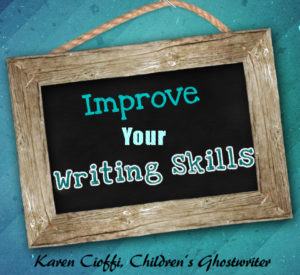 There are a number of strategies you can use to create and build your writing skills, but I’ve found there are five top strategies.
There are a number of strategies you can use to create and build your writing skills, but I’ve found there are five top strategies.
1. READ!
If you don’t read, you won’t know what good reading is. Along with this, it will help you fine tune your own writing, by broadening your vocabulary.
Another thing that reading does is to help you find the right words to write specific scenes. For example, how does one author write an action scene compared to another. Which do you find works better?
Reading fiction also provides ideas for crafting sentences and paragraphs. You see how other authors start their books, how they craft their settings, how they structure the story arc, and so much more.
Analyze books as you read them. Find out what makes one work compared to one that doesn’t.
And, be sure to read books in different genres. It will give you a sense of other writing styles.
2. Pay attention to how you write.
What’s your process like?
Do you just go for it, being a pantser? You start typing and let the words, sentences, paragraphs, chapters, flow.
Or, do you need more structure, like an outliner? Do you take your time and create an outline of how the story starts right on through how it ends?
Do you take your time with an idea, mull it over for a while?
I’m a pantser, usually. I jump in and see where the story takes me. But, with longer stories, it may not be the wisest choice. Longer stories need more structure.
3. Don’t be in a rush.
Writing is a deliberate action. Even if you’re a pantser, you do need to choose the right words, the right sentence structure, the right sequence of events, and so on. This takes thought and time.
You don’t want to rush through this.
You may thought decide to get the story down and then worry about this in the editing phase, but sooner or later you do need to dig in and sort things out. This will make the difference between sloppy, unprofessional writing and professional writing.
There are also some studies that show that writing too fast can actually do more harm than good to the creative process. Don’t let this happen to you.
4. Practice, practice, practice.
Whether it’s writing, sports, music or anything else, practice is essential.
According to Kameron Hurley, author and writing teacher Carol Emshwiller, said, “Practice doesn’t make perfect. Practice makes permanent.” (1)
Now, everyone knows that practice won’t make perfect, as there is no perfection, but making your writing permanent is just as good.
Practicing allows the brain to learn how to write. It become a habit.
If you are practicing ‘good’ writing, it will become hard-wired into your brain. This means you’ll automatically start writing good stories.
According to TeachThought.com, after a neurological experiment of the affects of practicing, “By the end of the learning process, the amount of effort they expended to carry out the task had declined about 20 percent from when they started.” (2)
So, along with the knowledge and process becoming embedded in your brain, you spend less energy on the same task after practicing it.
Interesting.
5. You’ve got to be determined and focused.
According to the article Focus, Determination, and Perseverance = Writing Success, “Focus, determination, and perseverance are essential to just about every aspect of your life. Each characteristic is unique and together create a powerful synergy.” (3)
Focus is one’s ability to concentrate exclusively on a particular thing through effort or attention. And determination is an unchanging intention to achieve a goal or desired end.
This is what you need to create and improve your writing skills.
Use these five writing tips and watch your writing skills improve.
(1) https://www.kameronhurley.com/practice-makes-permanent/
(2) https://www.teachthought.com/learning/the-neurological-benefits-of-practice/
Whether you need rewriting or ghostwriting, let me take a look at your story. Just send me an email at: kcioffiventrice@gmail.com. Please put “Children’s Writing” in the Subject box. Or, give me a call at 347—834—6700
Let’s get your idea off the launch pad or your outline into a publishable story today!
4 Writing Tips on Using Descriptions


2 thoughts on “5 Top Tips to Boost Your Writing Skills”